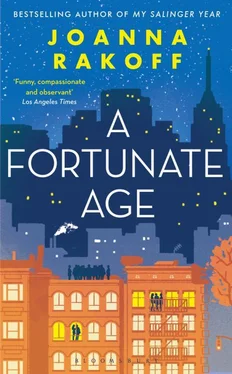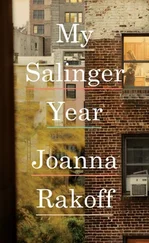“Okay,” said Beth.
Ten minutes later they were seated at a small table at the café with fresh cups of coffee in front of them. Beth’s face, pink from the cold water, had gone slack and impassive. “So we can go home and see Dad, if you want. Or we can just poke around here a bit, maybe get you some new shoes. Is there anything you need?” Beth shook her head and took a sip of coffee. “We can look at wedding dresses,” she said in a low voice, her eyes fixed firmly, childishly , on her place mat. “Oh, honey, no,” cried Mrs. Bernstein, who now, unaccountably and much to her distress, felt like she might cry. Why, why, why , she asked herself. “This isn’t the right day. You need to figure out what you want. If you’re still in love with Dave, you can’t marry Will. It’s unfair to you, but it’s more unfair to Will and to Sam, too. Beth, he’s been married before, to someone who treated him badly. When he asked you to marry him, he meant it for keeps. Honey, think about it. He wouldn’t even let you meet that poor child until he knew you were going to be his stepmother.”
“I know all that, Mom,” Beth said, in a cold, distant tone. “And I know I want to marry him. We can get the dress today and order the invitations. I forgot to ask him about the wording, though.” Annoyance overtook Mrs. Bernstein and she struggled to tamp it down. What was wrong with Beth? She pitches some sort of fit, about how Dave—a person with the emotional development of a sixteen-year-old— understands her. And now, when Mrs. Bernstein takes her concerns seriously—rather than dismissing them, as most mothers would have—she insists that everything is fine and they carry on planning the wedding. Did she think her mother would be disappointed in her if she didn’t marry Will, with his blue-chip job and his natty suits? She and Don had tried—in every possible way—to make their children independent thinkers, to let them know that their parents would love them no matter what path they chose in life. She had not—not ever —suggested to Beth that she marry for any reason other than love. (And she had shuddered, some months back, when Beth told her an awful story about Sadie’s mom dismissing Tal, such a great kid, because he was an actor and would “never make a real living.”)
But the trouble with Dave—who was from a very nice family, and Jewish (which Will, of course, was not, a fact that would cause some problems with the ceremony, but she wouldn’t think about that now)—wasn’t simply that he had neither money nor the impetus to make it. The trouble was Dave himself. He just didn’t have it in him, to take care of Beth, in any way . Instead, Beth would end up taking care of Dave, catering to his every mood and whim. What Dave needed was not a dreamy kid like Beth but someone like Lil, a forthright go-getter who would shake him out of his stupor, who would refuse to tolerate his selfishness. He was nothing but a spoiled little boy. But then, that was exactly the type that made women cry in public restrooms, wasn’t it? She’d met her share of such types. In college, of course. And later, too.
Some years back, when Beth was just a little girl in overalls and braids (and Jason not yet born), a tall, curly-haired substitute began appearing at the high school, clad in a black turtleneck and a tweed blazer, like Hollywood’s version of an English professor. As it turned out, he was a professor, of sorts: a Yale Ph.D. who’d failed to get tenure at some small New England college and returned home to his parents’ house on Larchmont Avenue. The students had worshipped him—his dark, wounded eyes, his unsettling habit of answering a question with a question—and the female teachers (married and single) quivered whenever he entered the staff lounge. In the end, he’d run off to Oregon with a precocious seventeen-year-old from Mrs. Bernstein’s Honors class. The girl’s parents—the Goldbergs of Christie Street—eventually went to the police, who put out a warrant for the man’s arrest. Though by the time the Portland cops found him—in some squat or something—the girl had sensibly put herself on a bus back to New York.
The man returned, too, some years later. He’d tapped Mrs. Bernstein on the shoulder one day, not so long ago, at the MOMA—a traveling exhibit of Picasso’s paintings of women, aptly enough—and said, “Scarsdale High School, right?” Though her hair was shorter—trimmed to her shoulders—Mrs. Bernstein knew she looked much the same as she had twenty years prior. The man, however, bore no resemblance to his younger self; he’d had to recount his biography (Yale, Oregon, young Jodi Goldberg, police) before she could place him. Time had not been kind to him, though his eyes still glimmered, darkly, with the provocative charisma of a tragic hero. She was, she realized, a good deal younger than he, though she hadn’t thought so during their brief period as colleagues (she with a little girl and a husband and a large house). Then, she’d resisted his attempts at banter; she’d not been one of the women who’d gathered around the whorl of his pipe smoke, waiting to be favored with a sliver of attention. And she was surprised that he’d even remembered her; in fact, if she was honest with herself, she was flattered to be plucked out of a crowd, her face remembered from two decades before. But she’d simply said “Hello, hello” and “How are you?” and “Nice to see you” and gone on her way. Later, she heard, through the grapevine of old Scarsdale families—to which she now belonged, having married into one—that the man had been hospitalized, repeatedly, for some sort of drug problem. His parents had bought him an apartment in Chelsea and were “helping out” while he started up a tutoring business and wrote a novel about a working-class family on Martha’s Vineyard, where his own family summered.
But she herself had never, not really, been attracted to that sort of man: the desolate loner, the misunderstood genius. In her youth, these boys had been jargon-spitting hippies or self-serious radicals or hard-drinking painters. Today, it seemed, they were would-be rock stars or postmodern novelists or overeducated malcontents. Regardless, she always went more for the quiet, slow-and-steady-wins-the-race types—like Donald, whom she’d thought she might marry from the minute she met him, at the Hungarian Pastry Shop, on a blind date. She’d never really, truly loved anyone before him—not in the way Beth loved Dave—and it was the easiest thing in the world to say yes, when he’d said, casually, “Why don’t we get married?”
Now she wondered, as the waitress deposited a tarragon chicken sandwich in front of her: if that yes was causing Beth such anguish, then perhaps she oughtn’t make good on it, Dave or no Dave. “Beth,” she began, carefully. “You don’t have to marry Will just because you said you would. You can change your mind.” Perhaps she shouldn’t push the issue, she thought before continuing. “You don’t have to marry anyone . It doesn’t have to be a choice between Will and Dave. If Will isn’t the one, and Dave is maybe the one but not ready to commit to you right now, then you could just be alone for a while. You could get a new apartment. Your dad and I could help you find your own place.” Beth had sublet her sublet for the summer. As of July first, she’d be living with Will. “And I’d have to talk to your father, but I bet we could help with the rent.”
“No, Mom, no,” said Beth, her expression growing grim. Mrs. Bernstein ignored her. “You could just see Dave and figure out if it’s going to work. And maybe see some other people, too. You know, honey, lots of my friends didn’t get married until they were in their thirties and they were very happy. They had a lot of fun, living in the city on their own. It’s good to be on your own.”
Читать дальше












